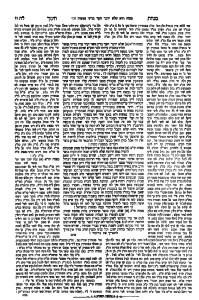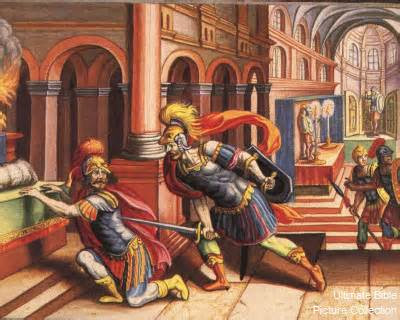Makos, 12a.
1- An interesting scenario examined by the Gemara: The Shogeg fellow, holed up in the Arei Miklot needs to patiently wait until the Kohen Gadol passes away.
But what happens if the Kohen Gadol is disqualified? How?
Kohanim are not allowed to marry divorcees. If they do then their children are categorized as chalolim – meaning blemished Kohanim and are prohibited to do any Avoda in the Beis Hamikdash and needless to say are disqualified from becoming a Kohen Gadol.

If we have an established Kohen Gadol and unfortunately it was ascertained that his mother, prior to marrying his father, had married and divorced, the Kohain is now thus forced to resign.
So we now have a situation where the Kohen Gadol (has not died, but) is removed from his post. He was obviously not fit to become a Kohen Gadol to begin with!
Does the disqualification retroactively void his entire career? If we assume that that is indeed the case then that would mean that when the Shogeg was originally convicted there was no valid Kohen Gadol in place. And the rule in such cases (conviction with no KG in place) is that he stays in the Arei Miklot forever- the death of a KG who was elected after his conviction does nothing for him.
On the other hand one may say that a disqualification does trigger a release for the Shogeg fellow. We discussed the rationale behind this school of thought; perhaps the disqualification of the KG is in a way as painful as his death. Etc.

2- We mentioned the Minchas Chinuch’s (410) pondering if a Kohen Gadol is removed by the king or by his fellow Kohanim….Yes that can happen as he quotes the Tosfos in Yuma 12b.
Minchas Chinuch_14092_page_282
Minchas Chinuch_14092_page_283
3- We briefly mention an overview of the first generation of Amoroyim – primarily Reb Yochanan in Israel and Rav and Shmuel in Bavel. Story of Reb Yochanan who had great respect for Rav but was unaware of Shmuel’s greatness.

4- Fascinating Tanach story with diverse explanations by the scholars of Israel versus the scholars of Bavel.

Briefly- the Tanach relates the story of Yoav being pursued by Shlomo Hamelech’s soldiers to execute him (as per Dovid Hamelech’s last wishes) for two murders (Avner ben Ner – David’s general, and Amasa, another of David’s officers and a nephew) Yoav committed years back.

Yoav runs into the Beis Hamikdash and hangs on to the corners of the Mizbeach thinking that this will save him. It does not help him and he is taken away and executed by Shlomo.
What was Yoav thinking? Our Gemara, written in Bavel says that Yoav erred in three points. The Torah says that a Kohen who is accused of murder should be taken away even if standing next to the Mizbeach. This implies that if he is standing on the Mizbeach no one can touch him.
So what was Yoav’s mistake?
One is that the Mizbeach offers sanctuary only when one is on the Mizbeach. Holding the horns is worthless. Two, it only applies to a Kohen while he is doing Avoda. Point three is that it is effective only in the Beis Hamikdash that was only built after this story. None of these condition were met by Yoav as he was not on the Mizbeach, he was not a Kohen and this was not the Beis Hamikdash.

But I’m on base!
We read the Rabbeinu Chanan’el who quotes Reb Yochanan (who compiled the Talmud Yerushalmi) who writes to the Babylonians that they have it all wrong on all points. For even a Kohen standing on top of the Mizbeach in the Beis Hamikdash gains nothing….
And even if the three points were valid it is unlikely that Yoav who was the head of the Sanhedrin would err on these points.
So what was Yoav thinking?
Reb Yochanan says that Israeli’s take on this story is that Yoav’s running into the Beis Hamikdash was (not connected with the Mizbeach at all but rather) an attempt to be judged by the Sanhedrin as opposed to the court of the monarchy. What was Yoav to gain?
Simple. If found guilty by the Sanhedrin his estate would be inherited by his children as opposed to the estate of one judged by Shlomo Hamelech that would be confiscated!
Positively loved the following: “But I’m on base!” Kudos to the guy who captioned this, אף שממרחקים הביא לחמו